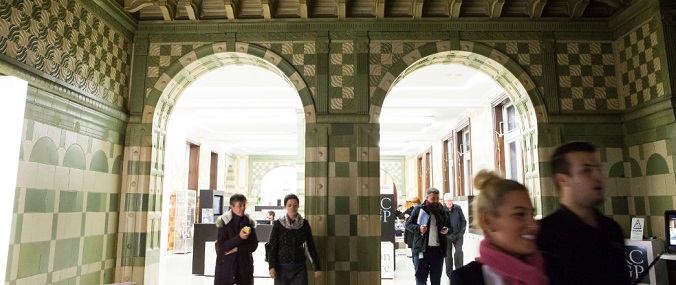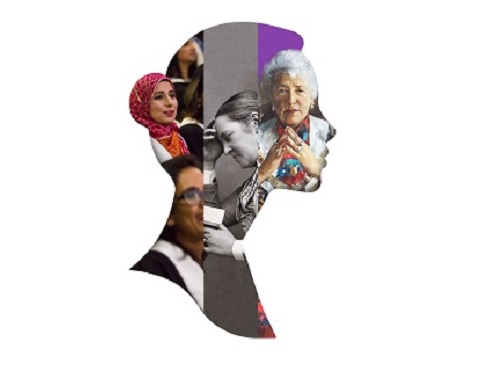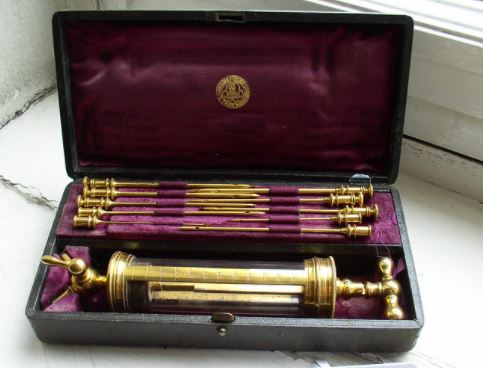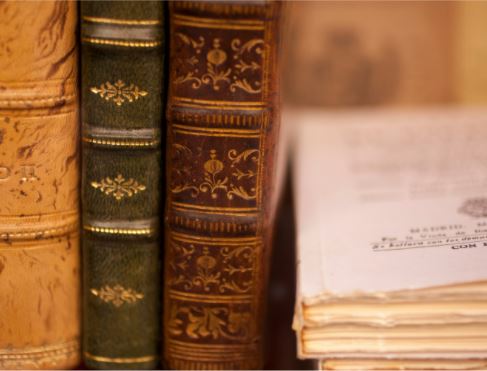College homes
7 Mansfield Street
The first College home is considered to be 7 Mansfield Street, where the first steering committee took place in 1952.
14 Blackfriars Lane
The first official address for the College was as an unincorporated association at The Society of Apothecaries, 14 Blackfriars Lane, London EC4 in November 1952.
54 Sloane Street
In 1953 The College rented meeting rooms at 54 Sloane Street, London, with meetings still taking place at Apothecaries Hall.
41 Cadogan Gardens
Lease taken on 41 Cadogan Gardens, Sloane Square in 1957 with the move of headquarters in 1958. A room was set aside to display plans of practice premises and articles of practice equipment, and the first College museum display was founded.
14-15 Princes Gate
In 1962 the College purchased 14 Princes Gate, previously the USA ambassador’s house, with headquarters moving into the building in 1963. A plaque was unveiled on 23 June 1967, to commemorate John F. Kennedy who had previously lived at Princes Gate. In 1977 the College purchased 15 Princes Gate, and in 1980 the Iranian Embassy Siege took place next door at 16 Princes Gate. Rooms in the College were used as a base by the Special Air Service during negotiations. The College was able to take vacant possession of the whole of 15 Princes Gate in 1992. In March 1994 new meeting rooms were opened in 15 Princes Gate named in honour of John Fry, John Horder and Ekke Kuenssberg. On 22 October 2004 a blue plaque was unveiled commemorating bankers Junius and John Pierpont Morgan's residence of the building. Princes Gate was sold in 2010.
1 Bow Churchyard
The College was briefly housed at 1 Bow Churchyard between 2010 and 2012 whilst building works took place at the new headquarters.The foundation years
1948 The NHS Service Act of 1946 came into effect on 5 July 1948.
1950 Formation of the General Practice section of the RSM (Royal Society of Medicine).
1950 Publication in The Lancet of "General Practice in England Today – A Reconnaissance" by Joseph S. Collings. Collings concluded that whilst specialist medicine had been growing and developing, there were no standards for general practice. There were no incentives to go into it, and the demands of national insurance put an intolerable strain upon the GP.
An attempt should be made to define the future province and function of general practice within the frame work of the National Health Service. This deliberative task should, in the first instance, be undertaken by the people most concerned – namely "ordinary" general practitioners.
1951 In June 1951, George MacFeat published a proposal for a College in the BMJ, "The family doctor", which John Hunt replied to. This indirectly led to John Hunt writing his memoranda on the subject to the BMA. Rose and Hunt's memorandum to the Lancet and the BMJ suggesting a college of general practice was published.
1952 On 19 November, the College of General Practitioners was formed.
1952 Formation of the first Steering committee took place in 1951, and in February 1952 was brought together.
"General practitioners ... are essential to the heart and soul of medicine. It is increasingly realised that this development and emancipation of general practice is not only a question of professional pride and status, but is an urgent economic need. Only by developing a higher standard of general practice, and by making full use of properly trained general practitioners (with access to hospital and laboratory facilities), can the present overcrowding of outpatient departments and excessive specialist consultations be avoided."
The early years: 1965 to 1977
1957 First Upjohn travelling fellowship awarded of £200, for not less than two weeks postgraduate study at a hospital, clinic or health centre.
1958 The research newsletter becomes the Journal of the College of General Practitioners.
1960 Journal of the College of General Practitioners founded.
1961 In March, the coat of arms is granted.
1962 The College became incorporated.
1963 Richard Scott becomes world’s first Professor of General Practice at Edinburgh University.
1963 In April, the College was registered as a charity.
1964 Annis Gillie becomes the first female College president.
1964 In a reversal of past policy, it was agreed that members could use the initials MCGP.
1965 In November, the MCGP (later MRCGP) exam was introduced.
1966 The new GP Contract was introduced.
1967 Membership by examination was made compulsory for new members.
1967 "Royal” prefix was added to the College's title.
1968 First William Pickles lecture, "The passing of the ‘eight’ train" by Patrick Byrne.
1977 to 2000
1981 The publication office was formed.
1982 First members’ reference book published.
1983 College launched its ‘Quality Initiative’, which encouraged doctors to define the services they felt their practices should be providing and to monitor their ability to do so.
1990 First Edition of RCGP Scottish magazine Rocket, later known as Hoolet.
1990 Changes to the GP Contract in 1990, following proposals in the 1987 White Paper ‘Promoting better health’. The new contract was imposed by Kenneth Clarke and was intended to improve services and incentivise GPs through performance-related payments. It was a cause of tension between the medical profession and the Department of Health.
2000 to the present day
2002 In July, Foundation Members (those who had joined the College before the first AGM in November 1953) were presented with special 50th anniversary medals.
2002 In September, the BJGP went online.
2002 In November, RCGP tartan was launched - a gift from Bill Reith, outgoing chairman of Scottish Council.
2003 The new College Charter was signed.
2004 New GP Contract with performance related remuneration through the Quality and Outcomes Framework.
2006 New members' ceremonies started.
2007 GP curriculum launched, and the MRCGP became compulsory to attain CCT.
2008 The journal InnovAiT was launched.
2012 RCGP gained approval from Medical Education England to extend GP training from three to four years.
- William Norman Pickles, 1953 to 1956: born 1885; died 1969
- Ian Dingwall Grant, 1956 to 1959: born 1895; died 1962
- George Francis Abercrombie, 1959 to 1962: born 1896; died 1978
- Fraser Mackintosh Rose, 1962 to 1964: born 1897; died 1972
- Katherine Annie Gillie, 1964 to 1967: born 1900; died 1985
- John Henderson Hunt, 1967 to 1970: born 1905; died 1987
- George Ian Watson, 1970 to 1973: born 1909; died 1979
- HRH Prince Philip, 1972 to 1973: born 1921; died 2021
- Patrick Sarsfield Byrne, 1973 to 1976: born 1917; died 1980
- Ekkehard V Kuenssberg, 1976 to 1979: born 1913; died 1920
- John Plaistow Horder, 1979 to 1982: born 1919; died 2012
- John Alexander Reid Lawson, 1982 to 1985: born 1920; died 2001
- Victor William Michael Drury, 1985 to 1988: born 1926; died 2014
- Stuart John Carne, 1988 to 1991: born 1926
- HRH Prince Charles, 1991 to 1992: born 1948
- Alaistair Geoffrey Donald, 1992 to 1994: born 1926; died 2005
- Lotte Therese Newman, 1994 to 1997: born 1929; died 2019
- Denis John Pereira-Gray, 1997 to 2000: born 1935
- Lesley Southgate, 2000 to 2003: born 1943
- Roger Neighbour, 2003 to 2006: born 1947
- David Antony Haslam, 2006 to 2009: born 1949
- Iona Heath, 2009 to 2012: born 1950
- Michael Pringle, 2012 to 2015: born 1950
- Terence John Kemple, 2015 to 2017: born 1952
- Mayur Lakhani, 2017 to 2019: born 1960
- Amanda Caroline Howe, 2019 to 2021
- Clare Mary Louise Francis Gerada, 2021 to 2023: born 1959
- Richard Mark Vautrey, 2023 to present: born 1964
- George Francis Abercrombie*, 1952 to 1956
- Fraser Mackintosh Rose*, 1956 to 1959
- Katherine Annie Gillie*, 1959 to 1962
- Kenneth M. Foster, 1962 to 1964
- Harry N. Levitt, 1964 to 1967
- George Swift, 1967 to 1970
- Ekkehard V. Kuenssberg*, 1970 to 1973
- John Alexander Reid Lawson*, 1973 to 1976
- Michael J Linnett, 1976 to 1979
- Alaistair Geoffrey Donald*, 1979 to 1982
- Donald Irvine, 1982 to 1985
- John Hasler, 1985 to 1987
- Denis John Pereira Gray*, 1987 to 1990
- Colin Waine, 1990 to 1993
- William McNeil Styles, 1993 to 1996
- John Toby, 1995 to 1998
- Michael Pringle*, 1998 to 2001
- David Antony Haslam*, 2001 to 2004
- Mayur Lakhani*, 2004 to 2007
- Steven J. Field, 2007 to 2010
- Clare Mary Louise Francis Gerada*, 2010 to 2013
- Maureen Baker, 2013 to 2016
- Helen Stokes-Lampard, 2016 to 2019
- Martin Marshall, 2019 to 2022
- Kamila Hawthorne, 2022 to present
- John M. Henderson, 1953 to 1956
- William S. Gardner, 1956 to 1959
- Lowell Lamont, 1959 to 1962
- Ian M. Scott, 1962 to 1965
- John A. R. Lawson, 1965 to 1968
- James S. Scobbie, 1968 to 1971
- Richard Scott, 1971 to 1974
- David E. Fraser, 1974 to 1977
- James D. E. Knox, 1977 to 1980
- Stanley C. Freedlander, 1980 to 1983
- Donald W. Maclean, 1983 to 1986
- Norman D. Jarvie, 1986 to 1990
- George E. Shirriffs, 1990 to 1993
- Jim Rodger, 1993 to 1996
- Colin M. Hunter, 1996 to 2000
- William (Bill) Reith, 2000 to 2003
- Mairi Scott, 2003 to 2007
- Ken Lawton, 2007 to 2010
- John Gillies, 2010 to 2014
- Miles Mack, 2014 to 2017
- Carey Lunan, 2017 to 2020
- Chris Williams (co-chair), 2020 to 2023
- David Shackles (co-chair), 2020 to 2023
- Chris Provan, 2023 to present
- David M. Hughes, 1955 to 1961
- David Kyle, 1961 to 1964
- Wilfred V. Howells, 1964 to 1967
- John N. M. Parry, 1968
- Wilfred V. Howells, 1968 to 1971
- David F. Coulter, 1971 to 1974
- John H. Owen, 1974 to 1977
- R. Harvard Davis, 1977 to 1980
- J. Gwyn Thomas, 1980 to 1983
- Derek J. Llewellyn, 1983 to 1986
- Cen Humphreys, 1986 to 1989
- Bruce Lervy, 1989 to 1992
- Huw Lloyd, 1992 to 1995
- Geoff Morgan, 1995 to 1998
- Terry R. Davies, 1998 to 2001
- Mike Jeffries, 2002 to 2005
- Helen Herbert, 2005 to 2008
- Bridget Osborne, 2008 to 2011
- Paul Myres, 2011 to 2015
- Rebecca Payne, 2015 to 2018
- Mair Hopkin, 2018 to 2021
- Peter Saul, 2018 to 2021
- Rowena Christmas, 2021 to 2024
- Rowena Christmas, 2024 to 2027
- Dr Peter Colvin, 2001 to 2004
- Dr Jeni McAughey, 2004 to 2007
- Dr David Johnston, 2007 to 2010
- Prof Scott Brown, 2010 to 2013
- Dr John O’Kelly, 2013 to 2016
- Dr Grainne Doran, 2016 to 2019
- Dr Laurence Dorman, 2019 to 2022
- Dr Ursula Mason, 2022 to present
Thank you for your feedback. Your response will help improve this page.










